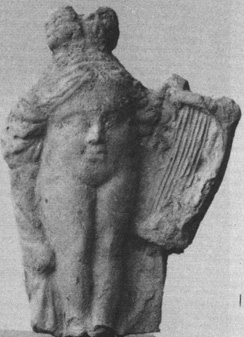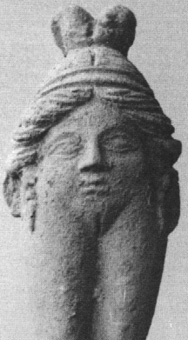「バウボー」の版間の差分
(→学問的な議論) |
(→学問的な議論) |
||
| 14行目: | 14行目: | ||
以下は、アレクサンドリアのクレメンスの『ギリシャ人への勧告』から、1919年の英訳を抜粋したものである。 | 以下は、アレクサンドリアのクレメンスの『ギリシャ人への勧告』から、1919年の英訳を抜粋したものである。 | ||
| − | <blockquote> | + | <blockquote>バウボーはデーメーテールを客として迎え、酒と食事を勧めた。デーメーテールは喪に服しているため、酒を飲みたくないと断った。バウボーは自分を軽んじられたと深く傷つき、自分の陰部を暴いて女神に見せた。デーメーテールはその光景を見て喜び、せめてもの救いの手を差し伸べた! これらは、アテネ人の秘密のミステリーだ! これらはオルフェウスの詩の主題でもある。</blockquote> |
2023年1月17日 (火) 10:56時点における版
バウボー(古代ギリシャ語:Βαυβώ、Baubo)は、ギリシア神話に登場する老婆で、特に初期オルペウス教の神話に登場する。歓楽の女神として知られ、下品で性的に自由な姿で描かれ、娘のペルセポネーを失ったデーメーテールが嘆くときに一緒に戯れたとされる。
学問的な議論
『ギリシャ神話』(1955年)の中で、ロバート・グレイヴスは、変装したデーメーテールがエレウーシスでセレウス王の客となったとき、王の足の悪い女中イアムベーについて、「この女中イアムベーが、この神話に登場する。」と書いた。
そして、老バウボーが冗談で麦酒を飲ませると、デーメーテールは苦しそうにうめき、不意にスカートからデーメーテールの息子イアッカスが現れ、母親の腕に飛び込んできてキスをした[1]。
グレイヴスは以下のように述べている。
イアムベーとバウボーは、エレウーシス神話で感情の緊張をほぐすために猥歌を歌った。イアムベー、デーメーテール、バウボーは、乙女、ニンフ、老婆というおなじみの三つ組みで擬人化されている。ギリシア神話に登場する老女は、ほとんどが女神の代わりの老婆である[2]。
以下は、アレクサンドリアのクレメンスの『ギリシャ人への勧告』から、1919年の英訳を抜粋したものである。
バウボーはデーメーテールを客として迎え、酒と食事を勧めた。デーメーテールは喪に服しているため、酒を飲みたくないと断った。バウボーは自分を軽んじられたと深く傷つき、自分の陰部を暴いて女神に見せた。デーメーテールはその光景を見て喜び、せめてもの救いの手を差し伸べた! これらは、アテネ人の秘密のミステリーだ! これらはオルフェウスの詩の主題でもある。
Baubo, having received Demeter as a guest, offers her a draught of wine and meal. She declines to take it, being unwilling to drink on account of her mourning. Baubo is deeply hurt, thinking she has been slighted, and thereupon uncovers her secret parts and exhibits them to the goddess. Demeter is pleased at the sight, and now at least receives the draught, — delighted by the spectacle! These are the secret mysteries of the Athenians! These are also the subjects of Orpheus’ poems. I will quote you the very lines of Orpheus, in order that you may have the originator of the mysteries as witness of their shamelessness:
“This said, she drew aside her robes, and showed a sight of shame; child Iacchus was there, and laughing, plunged his hand below her breasts. Then smiled the goddess, in her heart she smiled, and drank the draught from out the glancing cup.”[3]
Baubo figurines
Figurines known as Baubos are found in a number of settings, usually with Greek connections. They were mass-produced in a number of styles, but the basic figure always exposes the vulva in some way:
- A plump woman with her legs held apart, gesturing to her exposed vulva.
- A naked splay-legged figure holding a harp on the back of a boar.
- A naked headless torso with the face in the body and the vulva in the chin of the face.
- A seated figure with an exaggerated vulva filling the space between the legs.
- A naked squatting figure with her hands on her genitalia
The figurines usually had elaborate headdresses, and some hold cups or harps. Some figurines have a loop moulded into the head, which seems to indicate that they were suspended in some way (possibly as an amulet).
See also
- Anasyrma
- Dilukai
- Headless men
- Lajja Gauri
- Nin-imma
- Sheela na Gig
- Vagina and vulva in art
- Venus figurines
Bibliography
The following books are mostly about medieval sexual sculpture but have sections on Baubo:
- Dr. Jørgen Andersen, The Witch on the Wall: Medieval Erotic Sculpture in the British Isles, 1977.
- Miriam Robbins Dexter and Victor H. Mair, Sacred Display: Divine and Magical Female Figures of Eurasia. Amherst, New York: Cambria Press, 2010.
- Anthony Weir and James Jerman, Images of Lust: Sexual Carvings on Medieval Churches, 1986.
External links
- Examples of Baubo figurines
- Baubo in Clement of Alexandria's Exhortation to the Greeks The story of Baubo as related by Clement of Alexandria.
- Baubo figurines from the temple of Demeter at Priene, Turkey Face-in-body Baubo figurines.
参照
- ↑ The Greek Myths, Graves Robert, 1996, Folio Society, London, volume1, page92
- ↑ Ibid., p. 96.
- ↑ Clement of Alexandria. Translated by Butterworth, G. W. (1919), Loeb Classical Library, volume 92. Cambridge, Massachusetts. Harvard University Press.

